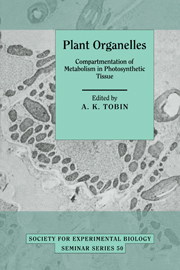Book contents
- Frontmatter
- Contents
- List of Contributors
- Preface
- Acknowledgements
- Metabolic interactions between organelles in photosynthetic tissue: a mitochondrial overview
- Metabolite transport in plant cells
- Metabolic interactions during photosynthetic and respiratory nitrogen assimilation in a green alga
- Carbon and nitrogen cycling between organdies during photorespiration
- Metabolic interactions between organelles in C4 plants
- Metabolic interactions in leaves of C3–C4 intermediate plants
- Metabolite compartmentation and transport in CAM plants
- Transport of H+, K+ and Ca2+ at the vacuolar membrane of plants
- Regulation of mitochondrial respiratory activity in photosynthetic systems
- Biosynthesis and assembly of the enzymes involved in lipid metabolism in plants
- The role of carnitine in plant cell metabolism
- Metabolic interactions of organelles in guard cells
- Transport of proteins into chloroplasts
- Metabolic interactions of organelles during leaf development
- Index
Metabolic interactions of organelles in guard cells
Published online by Cambridge University Press: 05 December 2011
- Frontmatter
- Contents
- List of Contributors
- Preface
- Acknowledgements
- Metabolic interactions between organelles in photosynthetic tissue: a mitochondrial overview
- Metabolite transport in plant cells
- Metabolic interactions during photosynthetic and respiratory nitrogen assimilation in a green alga
- Carbon and nitrogen cycling between organdies during photorespiration
- Metabolic interactions between organelles in C4 plants
- Metabolic interactions in leaves of C3–C4 intermediate plants
- Metabolite compartmentation and transport in CAM plants
- Transport of H+, K+ and Ca2+ at the vacuolar membrane of plants
- Regulation of mitochondrial respiratory activity in photosynthetic systems
- Biosynthesis and assembly of the enzymes involved in lipid metabolism in plants
- The role of carnitine in plant cell metabolism
- Metabolic interactions of organelles in guard cells
- Transport of proteins into chloroplasts
- Metabolic interactions of organelles during leaf development
- Index
Summary
The opening of stomata occurs as a result of an increase in turgor of the guard cells which is coupled to an uptake of potassium ions in relatively high concentrations (up to 400 mM: Raschke & Fellows, 1971; Outlaw, 1983). The active K+ transport has to be initiated by a process which requires a supply of energy in the form of ATP. There are two sources of ATP which are known to function in stomatal movement: in the light, photophosphorylation seems to act as a potential ATP source (Ogawa et al., 1979; Assmann et al., 1985; Gotow et al., 1985); in the dark, oxidative phosphorylation has been proposed as the energy source for the swelling of guard cells (Raghavendra, 1981; Shimazaki et al., 1983; Schwartz & Zeiger, 1984).
The role of ATP hydrolysis in ion uptake is still unresolved, although a membrane-bound Mg2+-activated ATPase and a K+-stimulated ATPase have been detected in the epidermis (Fujino (1967), Raghavendra et al. (1976), Kasamo (1979) and Lurie & Hendrix (1979)). The enzyme associated with stomatal opening was active in the light period, and was stimulated by fusicoccin and inhibited by abscisic acid (ABA). The other enzyme, coupled with stomatal closing, showed the opposite behaviour.
- Type
- Chapter
- Information
- Plant OrganellesCompartmentation of Metabolism in Photosynthetic Tissue, pp. 265 - 280Publisher: Cambridge University PressPrint publication year: 1992
- 2
- Cited by

